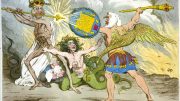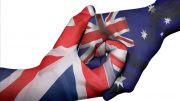An Australia-UK FTA is by no means a done deal
It looked almost unseemly that, within hours of the news that Britain had voted to leave the European Union, senior figures in Australia were proposing that discussions should begin as soon as possible about a Free Trade Agreement between Australia and the UK.
Soon after UK vote on June 24, with the ink not yet dry on confirmation of the “no” majority, former conservative Prime Minister Tony Abbott tweeted: “There will be more chance of an Oz FTA with Britain than with the EU”.
(2/2) There will be more chance of an Oz FTA with Britain
than with the EU.— Tony Abbott (@TonyAbbottMHR) June 24, 2016
Abbott’s suggestion quickly found favour with political and business leaders and, a few weeks later, became an official Australian Government position. Australia’s most senior ministers responsible for trade policy, Foreign Minister Julie Bishop and Trade Minister Steve Ciobo have already made official visits to London to formally broach the idea of setting up a bilateral working group of British and Australian officials to explore the potential for an Aus-UK FTA.
The rush to exploit what is perceived as a potential windfall for Australia from the British decision to turn away from Europe has, however, run into the complex political, legal and bureaucratic realities of the post-Brexit world.
The British Government told the Australian ministerial delegation that they will need to be very patient because it would probably not be possible for formal FTA negotiations with Australia to commence until the Brexit process was completed.
With the UK still bound by EU laws and treaties until they are revoked, the UK is prevented from undertaking any action that could adversely impact on the European Union.
Given that Australia and the EU are already engaged in an FTA scoping exercise ahead of the proposed commencement of formal negotiations next year, Britain would be in breach of its EU legal obligations to commence a separate negotiation with Australia.
Certainly, that is the strong view in Brussels.
When Trade Minister Ciobo met with members of the European Parliament’s foreign affairs and trade committee he was told in blunt terms that an Aus-UK FTA would be out of the questions until the Brexit process was completed.
An Australian authority on trade policy, Principal Fellow in the Faculty of Business and Economics at the University of Melbourne, Gabriele Suder, said that it would be a serious mistake for Australia to pursue an FTA with Britain ahead of the proposed Australia-EU FTA.
“This FTA with the EU now needs to be the very focus of Australia’s attention,” she wrote in a commentary on the issue. “The somewhat nostalgic ideas of some that a British Commonwealth construct would re-emerge is not only erroneous and disconnected from geopolitical realities. It is also counter-productive as it diverts attention from applicable plans.”
Nostalgia and long memories are certainly significant factors influencing the Australian support for the Brexit vote.
Leading a large Australian Brexit cheer squad was former, long-serving conservative Prime Minister (and Tony Abbott mentor) John Howard who said he was absolutely certain that Britain would be better off outside the EU, which he said was “a fundamentally flawed concept” and had always been doomed to failure.
Abbott is a strong advocate of the formation of an “Anglosphere” trade and strategic bloc, comprising Britain, the United States, Canada, Australia and New Zealand
Howard and Abbott are political descendants of the post-war generation of Australian conservatives who retained deep emotional and cultural connections to the UK and who always resented Britain’s European integration.
These Australians have long fought to retain Australia’s “Britishness”, including being leaders of the resistance to the idea of Australia becoming a republic.
This is despite the fact that trade and economic links between Australia and the UK have shrunk over the decades. From being Australia’s largest export market (24 per cent of the total) when Britain began integrating with Europe in 1963, Britain now accounts for just 1.4 per cent of Australia’s exports.
Given that the EU as a whole has been Australia’s largest economic partner (measured in trade in goods and services and two-way investment) for more than 25 years the idea of giving priority to negotiating an FTA with Britain over the EU would seem to need to be robustly tested.
by Geoff Kitney

Headline photo: Cattle in sale yards, Toowoomba, Queensland by Robert Kerton
Supplied by CSIRO Science Image
Used under the terms and conditions of Creative Commons license




